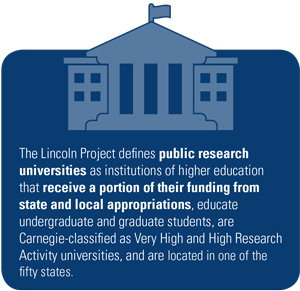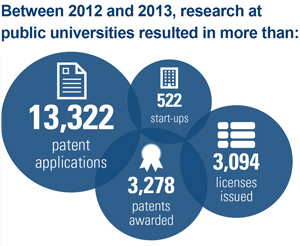 Over the past decade, state funding of public research universities has declined an average of 34 percent nationwide, a more severe drop than in any other sector of higher education. On average, state appropriations now account for only 18 percent of the total educational revenue per full-time equivalent student at public research universities – a dramatic decrease from 32 percent in 2000. In response, public research universities have cut spending and raised tuition in order to maintain their educational and research missions, but this trend is not sustainable.
Over the past decade, state funding of public research universities has declined an average of 34 percent nationwide, a more severe drop than in any other sector of higher education. On average, state appropriations now account for only 18 percent of the total educational revenue per full-time equivalent student at public research universities – a dramatic decrease from 32 percent in 2000. In response, public research universities have cut spending and raised tuition in order to maintain their educational and research missions, but this trend is not sustainable.
Since it began its work in January 2013, The Lincoln Project: Excellence and Access in Public Higher Education has studied the important role public research universities play in their communities and in the nation, and assessed the implications of rapidly declining state support for public higher education. On April 7, 2016, The Lincoln Project released its final report, Public Research Universities: Recommitting to Lincoln’s Vision – An Educational Compact for the 21st Century, with new recommendations for stabilizing and strengthening the nation’s public research universities that serve approximately 3.8 million students each year and perform much of the country’s groundbreaking research.
An Educational Compact for the 21st Century argues that public research universities cannot continue to cut academic programs without a negative impact on educational quality, and cannot further raise tuition without simultaneously increasing need-based financial aid. In this context, the report acknowledges that these institutions must pursue new revenue streams and cultivate partners from across the private and public sectors. Most importantly, the report formulates a new educational compact – a call for state and federal governments, universities, businesses, and philanthropic organizations to come together in support of America’s public research universities. Each sector has a role to play in preserving and strengthening these institutions, which are an essential component of the nation’s intellectual infrastructure and a key driver of American education, research, culture, and the national economy.
An Educational Compact for the 21st Century urges public research universities to lead the charge in forging this new compact. The report offers specific recommendations that these institutions might consider, including:
- Exploring and pursuing new revenue streams, consistent with the fundamental values of public research universities;
- Establishing annual cost and efficiency targets, and public progress reports for the university community and the broader public;
- Forming regional alliances with other colleges and universities to facilitate research partnerships, shared course offerings, collective purchasing contracts, common facility usage, and collaborations on innovative programs; and
- Signaling to the business community that public research universities are willing partners by accelerating and simplifying the transfer of knowledge to the private sector.
Some of the recommendations An Educational Compact for the 21st Century offers to state governments, the federal government, and the private sector include:

Recommendations for state governments:
- Finding alternative strategies to balance the budget besides cutting university funding;
- Reversing cuts made over the last decade, restoring funding to pre-recession levels, incrementally if not all at once; and
- Establishing long-term funding goals, including targets for the growth of state investment, to bring stability to higher education budgets and assist universities in planning.
Recommendations for the federal government:
- Recognizing that the intellectual infrastructure of the nation is as important to the future as the physical infrastructure;
- Encouraging partnerships among state governments, federal agencies, private philanthropists, and public research universities through the use of challenge-grant programs; and
- Reforming regulations that discourage students (especially low-income or first-generation college students) from applying for financial aid, including by simplifying the Free Application for Federal Student Aid (FAFSA).
Recommendations for the private sector:
- Acknowledging the importance of public research universities to the preparation of the American workforce by supporting public research university scholarships and internships;
- Engaging in public advocacy in each state on behalf of public research universities and in support of the nation’s intellectual infrastructure; and
- Promoting research partnerships and simplified intellectual property agreements.
An Educational Compact for the 21st Century is the fifth and final publication from the Lincoln Project. Previous publications provide an overview of the current financial challenges as well as the significant achievements of public research universities. The first publication, Public Research Universities: Why They Matter, describes the benefits of public research universities as well as the changing demands on these institutions. The second, Public Research Universities: Changes in State Funding, examines state financing of higher education, describes the challenges that state governments face, and assesses the prospects for greater state support in the future. Public Research Universities: Understanding the Financial Model, the third publication in the series, details the most common financial models that sustain public research universities, describes institutional responses to the changing financial climate, and examines new ideas for diversifying and enhancing funding sources in the future. The fourth publication, Public Research Universities: Serving the Public Good, describes the impact of public research universities on economic growth, civic engagement, scientific and technological discovery, and the well-being of individual students.
The Academy has disseminated broadly all five Lincoln Project publications to its membership, as well as to federal and state-level policy-makers and policy and higher education organizations. Over the next six months, The Lincoln Project will be holding events across the country with key leaders and partners at the institutional, state, regional, and federal levels to discuss how to implement the project’s final recommendations. Outreach meetings have been held already in Florida, Louisiana, Tennessee, Michigan, Texas, and Massachusetts.
Additional information about The Lincoln Project, including a short animated video and digital access to all of the project’s publications, is available on the project’s website.